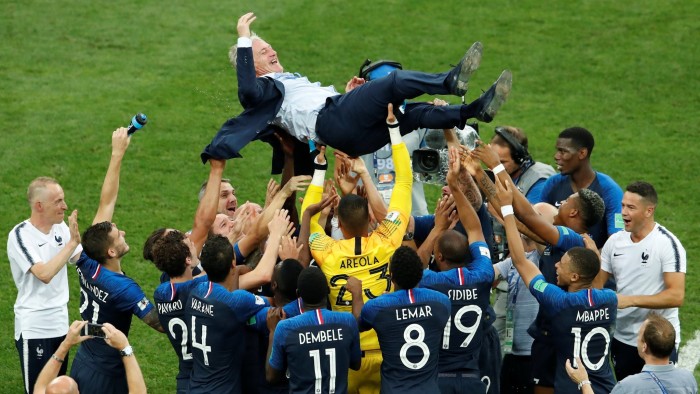Russia 2018 grips fans before worthy winner emerges

Roula Khalaf, Editor of the FT, selects her favourite stories in this weekly newsletter.
Why did it feel to most people like such an enjoyable World Cup? There were few classic games, and most teams were below the level that TV fans are used to from Champions League nights. “I don’t know if it was a beautiful World Cup,” admitted France’s winning coach Didier Deschamps. But he went on: “There were goals, and incredible situations.” And, he might have added, there was much more international goodwill on and off the field than in recent news headlines.
This World Cup surprised us almost daily. Germany arrived as world champions, played three nail-biting matches, lost two, and then were suddenly home again. Spain started with a 3-3 against Portugal that was arguably the tournament’s best game, then could easily have lost to Morocco or Iran before succumbing to Russia. Lionel Messi’s Argentina drew with Iceland, got thumped by Croatia, then somehow reached the next round with a cracking last-ditch goal of a type that Marcos Rojo may never score again.
The surprises kept coming. England won a penalty shootout. Belgium, who lit up the tournament, knocked out Brazil. The Brazilians were missing the magnificent Casemiro, scored a freakish own goal, then ran up against Thibaut Courtois’s unforgettable goalkeeping display. Their elimination should not obscure the truth that they were arguably the best team in Russia. And to cap all the surprises, Croatia, a country of 4m people, made the final.
Few teams defended nonstop. Even Panama and Saudi Arabia, tried to attack. Germany and Spain often left just two men at the back. They paid for it, but we neutrals benefited. There were 2.64 goals per game, close to the 2014 World Cup’s 2.7, but noticeably above the 2.23 and 2.3 of the borefests of 2010 and 2006.
The spirit of the event had also improved. There were only four red cards, compared with 28 in 2006. As ever since 2002, the hooligans failed to materialise, despite apocalyptic pre-tournament warnings. Instead, Russians danced on the streets with Mexicans and Senegalese. (The tournament seems to have been almost racism-free, too.) In Russian provincial cities hardly visited by foreigners before, it was almost as if UFOs full of friendly aliens had landed. Russians’ craving for foreign contact may have surprised Vladimir Putin.
The English especially had fun. Their team exceeded everyone’s expectations, and manager Gareth Southgate became a folk hero. But England’s stock peaked five minutes into the semi-final against Croatia, when Kieran Trippier’s gorgeous free-kick put them 1-0 up. They went on to lose to Croatia and then Belgium. England’s final record in actual matches, leaving aside the penalty shootout against Colombia, was an undistinguished won three, drawn one, lost three.
Reaching the semi-final may prove to be this team’s zenith. England played the semi in 1990, then failed to qualify for the next World Cup. Southgate’s men probably will not get as easy a run to the final stages again. And world champions typically have several players who have won multiple Champions Leagues. No Englishman has that kind of pedigree, though some might feasibly acquire it.
Still, it has been a happy month. The video assistant referee (VAR) removed much of the sourness of past tournaments, when teams could be sent home by referees’ blunders. True, Croatia could argue with two of referee Néstor Pitana’s decisions in the final: France’s Antoine Griezmann eagerly went down for the free-kick that led to the opening goal, but on the other hand Croatia’s Marcelo Brozovic did hit him. Then, Pitana’s award of the penalty looked harsh: Ivan Perisic may have handled unintentionally. However, that decision too was defensible.
Anyway, for all Croatia’s dazzling passing, France’s last two goals exposed Croat defensive weaknesses: Kylian Mbappé and Paul Pogba got time to shoot from distance, and keeper Danijel Subasic watched the balls fly past. Croatian coach Zlatko Dalic admitted: “If you concede four, you cannot expect a good result.”
France are worthy champions. And judging by the players’ joyous invasion of Deschamps’ post-match press conference, chanting his name and spraying all of us assembled there with water, energy drinks and champagne, they are nice guys too.
Comments